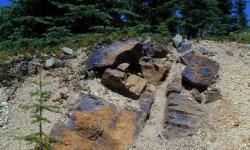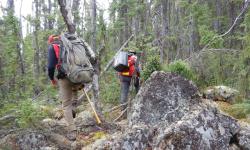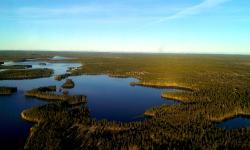Eagle Plains Commences Drilling Program at Yellowjacket Gold Project
British Columbia | September 17, 2010Cranbrook, B.C., September 17th, 2010: Eagle Plains Resources Ltd (TSX-V:EPL) has mobilized crews and equipment to commence a 2000-2500m drilling program on its 100% owned Yellowjacket Gold Project located near Atlin, BC. The program will consist of approximately 50 reverse-circulation (“RC”) drill holes targeting gold mineralization within the Yellowjacket Zone, within an area targeted for future excavation and development. Additional mapping and sampling is also being carried out in the Rock of Ages Zone, where two historic shafts have recently been exposed during ongoing placer mining activity. A budget of $450,000 has been set for the program which is expected to take 3-4 weeks to complete.
The Yellowjacket Project is located 9 km east of Atlin, BC and is accessed by all-season road. Hydro-electric power is located within 5km of property boundaries. The project received a B.C. Mines Act permit in July, 2009 for an open pit gold mine and onsite 400 tpd mill and concentrator, processing up to 75,000 tons per year . The Permit contemplates a 7–9 year mine life from a series of open pits entirely within an area of disturbed placer workings. The gold is recovered using a simple gravity concentrating recovery plant without the use of chemicals or additives. Eagle Plains owns both mineral (hard-rock) and placer rights within the Project area. In October 2009, Eagle Plains and Prize announced the formal ratification of an Impact and Benefits Agreement with the Taku River Tlingit First Nation.
The property is known to host significant gold mineralization. Gold is erratically distributed throughout the Yellowjacket structure such that accurate exploration and economic assessment of the property is challenged by a pronounced "nugget effect".
C.C. (Chuck) Downie, P.Geo, VP Exploration, Eagle Plains Resources and Project Manager for the Yellowjacket Venture states: "Going forward we need to focus on better definition of the Yellowjacket Zone in terms of near surface grade and tonnage through detailed chip sampling and shallow drilling. Expansion of the east pit indicates that the mineralized zone extends into areas that have not been tested by any diamond drilling and a better understanding of the distribution of the nugget gold should result in more efficient grade control. Our goal is to mine and process the near surface ore grade material, while continuing to explore and expand the overall gold resource. We will also be looking for potential partners to provide technical expertise and financing as the project moves forward.”
Tim Termuende, President and CEO of Eagle Plains recently stated: "The Yellowjacket project gives EPL strong leverage on rising gold prices. By using funds generated from the already permitted, low-cost gold production near surface, we can avoid dilution to shareholders and continue systematic exploration of this significant gold system with the aim of identifying a million-plus ounce gold resource."
Project History
In 1983, local area prospectors staked the area of the Yellowjacket Property and then optioned portions of the property to Canova Resources and Tri-Pacific Resources. During 1984 and 1985 these companies conducted programs consisting of ground geophysics, rotary- and diamond drilling. In 1986 Homestake Mineral Development Company optioned the property from Canova and initiated programs of mapping, reverse circulation drilling and diamond drilling.
In 1988, Homestake completed a ground geophysical program which consisted of 5.5 kilometres of magnetic and VLF-EM surveys. By 1988, Homestake Mining Company outlined the Yellowjacket Zone; a mineralized area containing significant gold intercepts over 2 kilometres by drilling 58 diamond drill holes to depths up to 183m.
As a result of this work, Homestake estimated an historical resource estimate of 453,500 tonnes grading 10.26 g/t gold (BC Dept Mines Open File 2000-2 page 41). (These are historical figures and do not currently comply with NI 43-101, though they are considered by management to be relevant and form a basis for future exploration of the Property)
Muskox Minerals (later renamed Prize Mining Corp.) optioned the property in late 2003 and began exploration in December of that same year to further outline the extent, nature, grade and geometry of gold mineralization at the Yellowjacket Zone. 41 holes were drilled in 2003-2004, thirteen of which encountered coarse gold that yielded assay intercepts similar to those obtained by Homestake. Muskox reported significant gold intersections (among others) of up to:*
- 80.3 g/t over 38.94 meters including 513.5 g/t over 5.56 metres in drill hole YJ03-01
- 80.5 g/t over 30.83 meters including 2397 g/t over 0.91 meters in drill hole TW05-02, a twin hole to YJ03-10
- 40.10 g/t over 6.10 metres in drill hole YJ04-07
- 142.40 g/t over 1.0 metres in drill hole YJ04-20
- 156.95 g/t over 0.5 metres in drill hole YJ04-22
(*press releases, November 15, 2004 and February 03, 2005)
In 2004, Canamera Geoscience Corp. under contract to Muskox conducted an airborne geophysical survey over the Property. A total of 820 line kilometres of airborne survey were flown by helicopter, using 50 metre spaced flight lines.
In 2005, Muskox/Prize performed a 50km magnetic survey which delineated three distinct zones: Yellowjacket, Rock of Ages and Gold Run. Six holes were drilled in the Yellowjacket Zone and 1.5 kilometres to the southwest, three holes were drilled in the Rock of Ages Zone, for a total of 895 metres.
In 2006, Muskox/Prize commenced an exploration bulk sampling program, which included diversion of Pine Creek, overburden/placer tailings excavation, construction of a 400 ton-per-day milling facility, bedrock mapping and channel sampling, bedrock excavation and processing. In 2007, Prize reported production of 6.43 kilograms (206.9 ounces) of gold produced from sluicing the placer-bedrock interface material excavated during bulk sample excavation. In 2008, Prize processed 4200 tonnes of material. Of this material, 2880 tonnes were considered to be taken from the main mineralized Zone and returned gold bars totaling 18.63 kilograms (599 ounces). About 800 kilograms of low grade gold concentrates from 2008 remain and are estimated to contain approximately 1.5 kilograms (50 ounces) of gold. These gold volumes back-calculate, using a formula that allows for smelting and processing plant recoveries, to a head grade of approximately 9 g/t gold.
In 2009, Eagle Plains and Prize contracted Barry Price, P.Geo. and Linda Dandy, P.Geo. to complete a 43-101 compliant technical report which summarize development of the property to date. The report identifies that “Based on the results of the exploration and development conducted to date on the Property, the authors conclude that the Yellowjacket Gold Zone represents a legitimate development target with the potential to host an economically feasible mineral deposit. Such potential is not quantifiable and can only be verified by additional exploration and development work.”
Details of the Yellowjacket Purchase
Under the terms of the original JVA, Eagle Plains earned an initial 40% interest in the Project from Prize by making a $2,000,000 cash payment. Since commencing activities, Eagle Plains has advanced the JV an additional amount of approximately $2,600,000. Prize Mining subsequently agreed to accept dilution of its interest in the project in accordance with a formula established in the YJV agreement. Prior to the purchase of the remaining Prize interest and dissolution of the YJV, Eagle Plains held a 59.62% interest. The total consideration for the purchase of Prize’s remaining 40.38% interest was $400,000 plus 2,000,000 Eagle Plains common shares. These shares are subject to escrow restrictions over a two year period (see NR August 18th, 2010).
About Eagle Plains Resources
Eagle Plains continues to conduct research, acquire and explore metal projects throughout western Canada. In addition to holding mining royalties on various projects, Eagle Plains controls over 35 gold, base-metal and uranium projects, several with third parties including Excelsior Mining Corp (TSX:MIN.P), Sandstorm Resources Ltd. (TSX-V:SSL), Sandstorm Metals and Energy Ltd. (TSX-V:SND), Providence Capital Corp., Waterloo Resources Ltd. (TSX-V:WAT.P), Prize Mining Corp. (TSX-V:PRZ), Windstorm Resources Inc., 0802906 BC (a private BC Corporation); Heemskirk Canada Ltd., Touchdown Capital Inc. (TSX-V: TDW) and 99 Capital Corp. (TSX-V:WDG). In recent years, Eagle Plains has completed option agreements with Teck Limited (TSX:TCK.B), Alexco Resource Corp. (TSX-V:AXR), Billiton Metals, Rio Algom Exploration, NovaGold Resources, Kennecott Exploration and numerous other junior exploration companies, resulting in over 53,600m (163,370’) of drilling and over $28.3 million in exploration spending on its projects since 1998.
Expenditures during 2008 and 2009 on Eagle Plains’ projects were approximately $7,300,000, funded by Eagle Plains and third party partners. This work resulted in approximately 6,900m of drilling and extensive ground-based exploration work and facilitated the advancement of numerous projects at various stages of development.
Technical aspects of this news release have been reviewed and approved by C.C. Downie, P.Geo., hereby designated as a qualified person under National Instrument 43-101.
On behalf of the Board of Directors
“Tim J. Termuende”
President and CEO
For further information on EPL, please contact Mike Labach at 1 866 HUNT ORE (486 8673)
Email: mgl@eagleplains.com or visit our website at http://www.eagleplains.com
Cautionary Note Regarding Forward-Looking Statements
Neither the TSX Venture Exchange nor its Regulation Services Provider (as that term is defined in the policies of the TSX Venture Exchange) accepts responsibility for the adequacy or accuracy of this release. This news release may contain forward-looking statements including but not limited to comments regarding the timing and content of upcoming work programs, geological interpretations, receipt of property titles, potential mineral recovery processes, etc. Forward-looking statements address future events and conditions and therefore, involve inherent risks and uncertainties. Actual results may differ materially from those currently anticipated in such statements.
Latest News Releases

Eagle Plains Partner Earthwise Completes Data Review of the Iron Range Gold Project, British Columbia

Eagle Plains and Sun Summit Minerals Execute Option Agreement for the Theory Copper-Gold Project, British Columbia

Eagle Plains and Earthwise Minerals Execute Option Agreement for the Iron Range Gold Project, British Columbia

Eagle Plains and Partner Refined Energy Receive Permit for Drilling at Dufferin West Uranium Property, Saskatchewan

Eagle Plains Announces Letter of Intent with Earthwise Minerals for Option of the Iron Range Project, British Columbia

